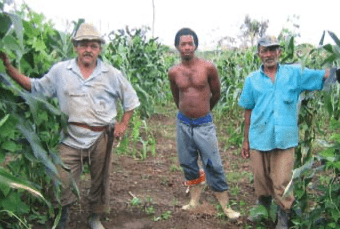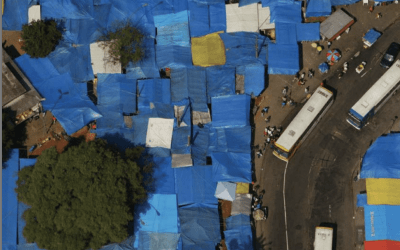Land Reform and Community Building
A few minutes before eight, Marquinho runs across the dusty square to invite us to his newly-built house for the evening television novela. But we have already been invited by several other families. Our conflicting situation reflects the changing life in Menino Jesus.
Once the former squatters negotiate their land titles and begin to build their houses the communal evenings of singing and talking give way to the individualization of family life. Thus, the very raison d’etre of the group—getting land parcels for poor families—puts into question other goals: remaining politically-active, solidarity-based communities.
Menino Jesus lies some hundred miles northwest of the city of Salvador in the state of Bahia, Brazil. It is one among more than 3,000 communities that the Landless Workers’ Movement (MST) has helped build since 1984. On December 20, 1998 some 250 families had squatted on parts of a private estate, claiming that the fertile land remained idle and could be granted to them according to agrarian reform law. For six years, old and young lived as acampados, under the permanent threat of dislodgement by police or the landowner. By June 2006, the remaining 212 families had received titles for 40-hectare (99 acres) lots. Dispersed brick houses were beginning to replace the tight group of shacks made out of thin black plastic foil and sticks. By pooling the community’s labor and making their own ecological tijolos (bricks), houses with an average foundation of 40 square meters could be built. Leftover money from the US$2,000 per family government-subsidy for these houses is used for other community projects and the movement. The new houses have a cement base, windows and sewer, varying according to seven different floor plans.
Committees to build houses and oversee health needs, education, youth projects, or cultural activities form cornerstones of the MST communities and distinguish them from other forms of land occupation in Brazil. In one abandoned building of the former fazenda, 23 year-old Maria teaches children until the fourth grade. She has just come back from three months at the MST’s national Florestan Fernandesschool, near São Paulo, where she will return after three alternating months of practical work. We witness a day-long meeting of the community’s various committee representatives, community leaders who discuss at length the new challenges of community cohesion during the period of family settlement. During the initial phase of land-squatting, external threats and a common goal are pervasive. But after land-titles have been negotiated between MST leaders and the INCRA (Land Reform Institute), individual and family-centered concerns tend to get re-magnified. Moreover, the land must eventually be paid back. In addition to individual family plots, cash crops such as maize and manioc are tended to by the whole community, yielding money for infrastructure, including a community radio station.
In the nearby town of Agua Fria a group from Menino Jesus attends a rally of the candidate for governor of the Workers’ Party (PT), Jaques Wagner. Our transport is a newly-acquired Mercedes bus from the 1960s that Lampion, one of the Menino Jesus’ most salient leaders, must often repair. He and others debate the movement’s relationship to the PT, supporting its broad policies, but criticizing the growth of export-agribusiness as opposed to endogenous, small-scale farming. A former squatter MST leader, Valmir Assunção is now himself secretary of development in Bahia. Jessica and Karina, attending eighth grade in Agua Fria, proudly wear stickers with his photo. Since 2005, new campaigning laws restrict other paraphernalia such as T-Shirts. The girls tell us about an upcoming meeting of all MST youth in the state of Bahia where they will come together for days of discussing their needs, aspirations and challenges. The girls identify with the movement but at the same time are attracted by lifestyles in the cities. The second generation, those born or raised in MST-communities, is still working out its own compromise between urban poverty and rural alternatives.
Spring 2007, Volume VI, Number 3
Miriam Boyer is a sociology graduate student at Columbia University. She is pursuing work on state theory and Latin American social movements.
Rainer Schultz is pursuing a Ph.D. in Latin American history at Harvard. His interests include the history of socialist policies with an emphasis on Cuba. They spent one month with the MST.
Related Articles
Violence Against Women in Brazil: Public Policy and its Implementation in Rural Areas
English + Português
Eight o’clock in the evening—it’s time to gather and watch the national news program in Rio de Janeiro, Brazil.
2022: Uma Encruzilhada Histórica
English + Português
Este segundo turno da eleição 2022 no Brasil é um embate histórico entre visões de mundo. Entre concepções de vida e seus sistemas de valores. Você vai eleger (etimologia: escolher) em que mundo seria concebível viver.
Editor’s Letter: Brazil
Brazil is different. Brazil is huge. Brazil is colorful. Brazil is magic. In Brazil, the people speak Portuguese instead of Spanish.





